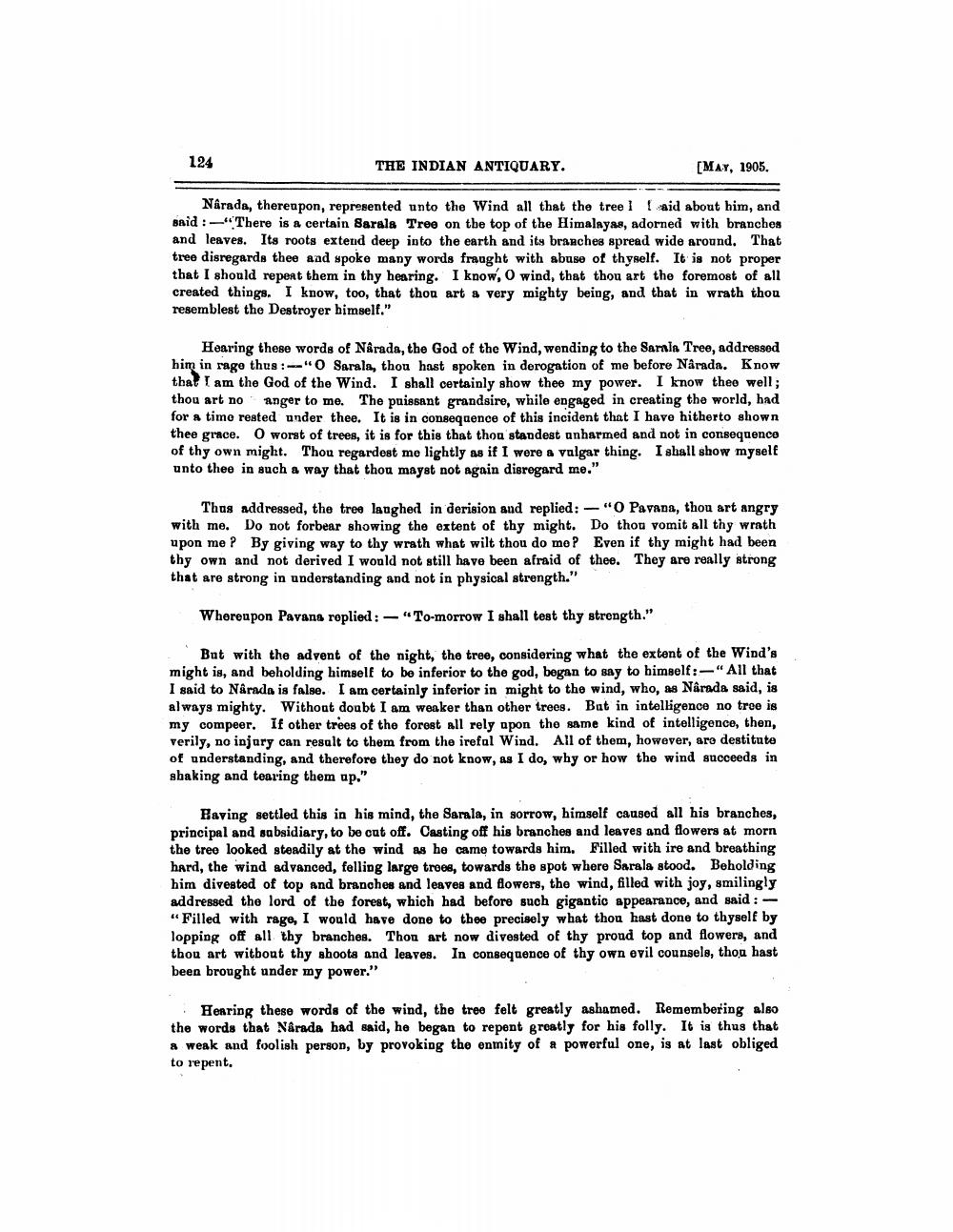________________
124
THE INDIAN ANTIQUARY.
[MAY, 1905.
Nârada, thereupon, represented unto the Wind all that the tree laid about him, and said: "There is a certain Sarala Tree on the top of the Himalayas, adorned with branches and leaves. Its roots extend deep into the earth and its branches spread wide around. That tree disregards thee and spoke many words fraught with abuse of thyself. It is not proper that I should repeat them in thy hearing. I know, O wind, that thou art the foremost of all created things. I know, too, that thou art a very mighty being, and that in wrath thou resemblest the Destroyer himself."
Hearing these words of Nârada, the God of the Wind, wending to the Sarala Tree, addressed him in rage thus: "O Sarala, thou hast spoken in derogation of me before Nârada. Know that I am the God of the Wind. I shall certainly show thee my power. I know thee well; thou art no anger to me. The puissant grandsire, while engaged in creating the world, had for a time rested under thee. It is in consequence of this incident that I have hitherto shown thee grace. O worst of trees, it is for this that thou standest unharmed and not in consequence of thy own might. Thou regardest me lightly as if I were a valgar thing. I shall show myself unto thee in such a way that thou mayst not again disregard me."
Thus addressed, the tree laughed in derision and replied: "O Pavana, thou art angry with me. Do not forbear showing the extent of thy might. Do thou vomit all thy wrath upon me? By giving way to thy wrath what wilt thou do me? Even if thy might had been thy own and not derived I would not still have been afraid of thee. They are really strong that are strong in understanding and not in physical strength."
Whereupon Pavana replied: "To-morrow I shall test thy strength."
But with the advent of the night, the tree, considering what the extent of the Wind's might is, and beholding himself to be inferior to the god, began to say to himself:-"All that I said to Narada is false. I am certainly inferior in might to the wind, who, as Narada said, is always mighty. Without doubt I am weaker than other trees. But in intelligence no tree is my compeer. If other trees of the forest all rely upon the same kind of intelligence, then, verily, no injury can result to them from the ireful Wind. All of them, however, are destitute of understanding, and therefore they do not know, as I do, why or how the wind succeeds in shaking and tearing them up."
Having settled this in his mind, the Sarala, in sorrow, himself caused all his branches, principal and subsidiary, to be cut off. Casting off his branches and leaves and flowers at morn the tree looked steadily at the wind as he came towards him. Filled with ire and breathing hard, the wind advanced, felling large trees, towards the spot where Sarala stood. Beholding him divested of top and branches and leaves and flowers, the wind, filled with joy, smilingly addressed the lord of the forest, which had before such gigantic appearance, and said: - "Filled with rage, I would have done to thee precisely what thou hast done to thyself by lopping off all thy branches. Thou art now divested of thy proud top and flowers, and thou art without thy shoots and leaves. In consequence of thy own evil counsels, thou hast been brought under my power."
Hearing these words of the wind, the tree felt greatly ashamed. Remembering also the words that Narada had said, he began to repent greatly for his folly. It is thus that a weak and foolish person, by provoking the enmity of a powerful one, is at last obliged to repent.




